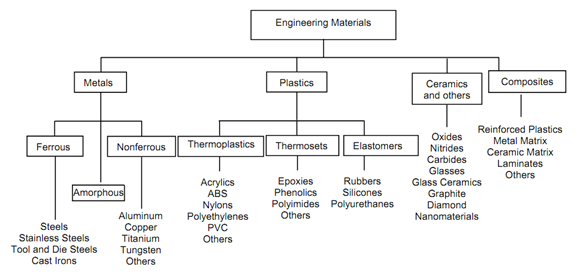Materials Used in Manufacturing
An ever-increasing variety of engineering materials are now available, each with their own, applications, characteristics, advantages and limitations as illustrated in Figure 2. The following are the general types of materials utilized in manufacturing industries today, either individually or in combination.
(a) Metals and their alloys, such like steel, iron, copper, aluminium, etc.
(b) Non-metals, such like rubber, glass plastic, etc.

Fig 2 : An Outline of Engineering Materials
Metals
The metals might be further classified as:
- Ferrous metals and
- Non-ferrous metals.
Ferrous metals are those that have iron as the main constituent, such like cast iron, wrought iron and steel, and so on.
Non-ferrous metals are those that contain a metal other than iron as their main constituent, such as, aluminium, copper, brass, tin, zinc, and so on.
Non-metals
Plastics
- Thermoplastics
- Elastomers
- Thermosets
Ceramics
- Glass ceramics
- Graphite
- Glasses
- Diamond
Composite Materials
Reinforced plastics, metal matrix & ceramic matrix composites and honey comb structures - these all materials are also known as engineered materials.
New Materials
- Nanomaterials,
- Amorphous alloys,
- Shape-memory alloys,
- Superconductors
several other materials with unique properties.